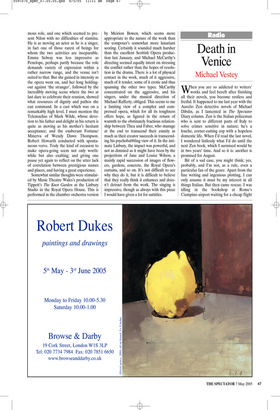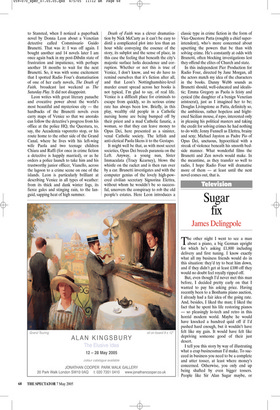Death in Venice
Michael Vestey
When you are so addicted to writers’ works and feel bereft after finishing all their novels, you become restless and fretful. It happened to me last year with the Aurelio Zen detective novels of Michael Dibdin, as I lamented in The Spectator Diary column. Zen is the Italian policeman who is sent to different parts of Italy to solve crimes sensitive in nature; he’s a louche, corner-cutting cop with a hopeless domestic life. When I’d read the last novel, I wondered listlessly what I’d do until the next Zen book, which I surmised would be in two years’ time. And so it is: another is promised for August.
Bit of a sad case, you might think; yes, probably, and I’m not, as a rule, even a particular fan of the genre. Apart from the fine writing and ingenious plotting, I can only assume it must be my interest in all things Italian. But then came rescue. I was idling in the bookshop at Rome’s Ciampino airport waiting for a cheap flight to Stansted, when I noticed a paperback novel by Donna Leon about a Venetian detective called Commissario Guido Brunetti. That was it: I was off again. I bought another and 14 novels later I am once again back in my post-Dibdin state of frustration and impatience, with perhaps another 18 months to wait for the next Brunetti. So, it was with some excitement that I spotted Radio Four’s dramatisation of one of her early novels, The Death of Faith, broadcast last weekend as The Saturday Play. It did not disappoint.
Leon writes with great literary panache and evocative power about the world’s most beautiful and mysterious city — the hardbacks of the Brunetti novels even carry maps of Venice so that we anoraks can follow the detective’s progress from his office at the police HQ, the Questura, to, say, the Accademia vaporetto stop, or his route home to the other side of the Grand Canal, where he lives with his left-wing wife Paola and two teenage children Chiara and Raffi (for once in crime fiction a detective is happily married), or as he orders a police launch to take him and his trustworthy junior officer, Vianello, across the lagoon to a crime scene on one of the islands. Leon is particularly brilliant at describing Venice in all types of weather: from its thick and dank winter fogs, its fierce gales and stinging rain, to the languid, sapping heat of high summer. Death of Faith was a clever dramatisation by Nick McCarty as it can’t be easy to distil a complicated plot into less than an hour while conveying the essence of the story, its subplot and the sense of place, in this case the feeling that beneath the city’s majestic surface lurks decadence and corruption. Whether or not this is true of Venice, I don’t know, and we do have to remind ourselves that it’s fiction after all, and that Leon’s Nottinghamshire-level murder count spread across her books is not typical, I’m glad to say, of real life. Venice is a difficult place for criminals to escape from quickly, so its serious crime rate has always been low. Briefly, in this play, wealthy old people in a Catholic nursing home are being bumped off by their priest and a mad Catholic fanatic, a woman, so that they can leave money to Opus Dei, here presented as a sinister, venal Catholic society. The leftish and anti-clerical Paola likens it to the Gestapo.
It might well be that, as with most secret societies, Opus Dei breeds paranoia on the Left. Anyway, a young nun, Sister Immaculata (Tracy Kearney), blows the whistle on the racket and is then run over by a car. Brunetti investigates and with the computer genius of the lovely high-powered civilian secretary Signorina Elettra, without whom he wouldn’t be so successful, uncovers the conspiracy to rob the old people’s estates. Here Leon introduces a classic type in crime fiction in the form of Vice-Questore Patta (roughly a chief superintendent), who’s more concerned about upsetting the powers that be than with solving crime. He’s constantly at odds with Brunetti, often blocking investigations lest they offend the elites of Church and state.
In this independent Pier Production for Radio Four, directed by Jane Morgan, all the actors match my idea of the characters in the books. Danny Webb sounds as Brunetti should, well-educated and idealistic; Emma Gregory as Paola is feisty and cynical (the daughter of a benign Venetian aristocrat), just as I imagined her to be; Douglas Livingstone as Patta, definitely so, the ambitious, rather hopeless and frightened Sicilian mouse, il topo, interested only in pleasing his political masters and taking the credit for solving crimes he had nothing to do with; Jenny Funnell as Elettra, brainy and sexy; Michael Jayston as Padre Pio of Opus Dei, unctuous, hypocritical with a streak of violence beneath his smooth bedside manner. What wonderful films the Brunetti and Zen novels would make. In the meantime, as they transfer so well to radio, I hope Radio Four will dramatise more of them — at least until the next novel comes out, that is.




























































 Previous page
Previous page